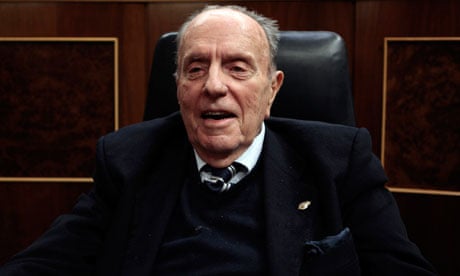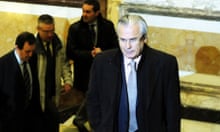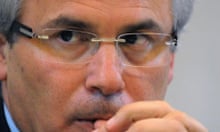Spain's last Francoist minister, Manuel Fraga, died on Monday leaving the People's party (PP)of the prime minister, Mariano Rajoy, to mourn its founder.
Fraga's ability to prosper in both dictatorship and democracy kept him in the limelight for almost half a century. He had recently stood down as a senator at the age of 89, and never lost his sharp tongue, nor his belligerent and sometimes authoritarian manner. "Homosexuality is an anomaly," was a recent contribution to the debate on gay marriage.
Fraga refused to apologise for his role in General Francisco Franco's governments, claimingclaimed Franco to have been the greatest Spaniard of the 20th century. Franco's regime was not fascist but only authoritarian.
Fraga was held up by some conservatives as proof that many regime figures were secret democrats obliged to compromise their ideals as they worked towards freeing Spain from its Francoist straightjacket.
"He characterised the path of the nation as it turned itself into a country of liberty," Rajoy said today.
Fraga was a ferocious critic of the historical memory movement, which campaigns on behalf of Francoist victims and digs up mass graves.
"There was an amnesty here, which means both mutual pardon and mutual forgetting," he said in a recent interview. "Amnesty means amnesia."
That amnesty covered Fraga's actions as interior minister in the unelected government that ran the country in the first year after Franco's death.
Campaigners had hoped he might be forced to answer questions about demonstrators killed by police in a time when Fraga denied boasting: "The street is mine!"
Some on the left claimed Fraga was proof of the persistence of Francoist attitudes within the People's party.
Jaime Rodrígues, a town councillor from the United Left coalition, drew fierce criticism last week by suggesting people should celebrate news of a sudden decline in Fraga's health with champagne.
"He was very right wing, very authoritarian ... but later played a positive role in having the constitution approved," said the former communist leader Santiago Carrillo.
Franco made Fraga his minister of information and tourism in 1962. He loosened censorship rules, allowing writers and journalists to publish first but using powers to sequester undesirable publications.
After the dictator's death in 1975 he founded a rightwing democratic party, Alianza Popular, together with half a dozen other former Francoist ministers.
After declaring that Marxism and separatism were the enemies of Spain, he went on to be one of the authors of Spain's 1978 democratic constitution.
By the mid-1980s he was leader of the opposition to Felipe González's socialists but his Francoist background meant he could take his party no further.
He handed over control of what had become the PP in 1990 and returned to his native Galicia, winning five elections in a row to head the regional government. He was finally ousted after losing his absolute majority in 2005.



